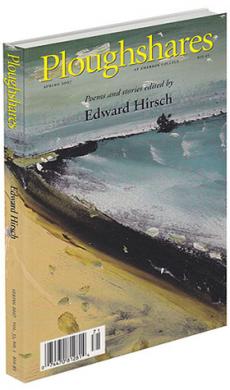Introduction
I want to send out this issue of Ploughshares in the high spirits of a Saturday morning in late March. I was alone and took a long walk by myself, but I also carried with me this surprising gathering of writers, this sudden congregation of solitaries, some from different countries, a few no longer living. It was solitude with others, some of whom scared me with their intensity, which is what one wants from art.
The day was clear, unusually clear, like a freshly wiped pane of glass, a window over the water, and blue, preternaturally blue, like the sky in a Magritte painting, and cold, vividly cold, so that you could clap your hands and remember winter, which had just left a few moments ago—if you strained you could still see it disappearing over the hills in a black parka. Spring was coming but hadn’t arrived yet. I walked on the edge of the park. The wind whispered a secret to the trees, which held their breath. On the other side of the street, the skyscrapers stood on tiptoe.
I walked down to the shore to watch the launching of a passenger ship. Ice had broken up on the river, and the water rippled smoothly in blue light. A Dutch painter would have appreciated the scene. The kiosks were open. Couples moved slowly past them, arm in arm, festive. Children darted in and out of the walkways, which sprouted with vendors. Voices cut the air. Kites and balloons. Handmade signs. Voyages to unknown places. The whole day had the drama of an expectation. It stood on the threshold of a discovery.
I thought of the lyric "Song" by the Spanish poet Rafael Alberti:
If my voice dies on land,
take it down to the sea
and leave it on the shore.
Take it down to the sea
and make it captain
of a white man-of-war.
Honor it with
a sailor’s medal:
over its heart an anchor,
and on the anchor a star,
and on the star the wind,
and on the wind a sail!
translated by Mark Strand
There is a deep sense of mortality in this poem, but Alberti very specifically doesn’t say, "If I die on land." He proposes—he would sing it if he could—something stranger: "If my voice dies on land." He wants his voice, metonymy of the self, symbol of poetry and music, to flow past the body, its earthly home. Take it down to the sea, he presses, and let it go. Don’t let it get stuck; don’t bury it. Let the voice captain a ship and be honored with a medal. Let it have an anchor with a star. Let it go beyond. Let it soar and sail.
Passion is what one craves in art—and life. Precision matters. Down at the water, the queenly ship was beginning to move away from the pier. Banners fluttered. One said: "Only mystery enables us to live. Only mystery." The passengers clustered at the rails on deck. I stood with a group onshore and waved goodbye to the travelers. People were laughing and crying. Some were jubilant; others were brokenhearted. I have always been both. Suddenly, a great cry went up and the ship set sail for the horizon. The ship rumbled into the future, but the cry persisted. I had no idea where that ship was going, but I felt lucky to see it off and bereft when it disappeared.

